|
|
|
Sort Order |
|
|
|
Items / Page
|
|
|
|
|
|
|
| Srl | Item |
| 1 |
ID:
148764
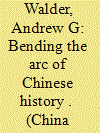

|
|
|
|
|
| Summary/Abstract |
Contrary to its initiators’ intentions, the Cultural Revolution laid political foundations for a transition to a market-oriented economy whilst also creating circumstances that helped to ensure the cohesion and survival of China's Soviet-style party-state. The Cultural Revolution left the Chinese Communist Party and civilian state structures weak and in flux, and drastically weakened entrenched bureaucratic interests that might have blocked market reform. The weakening of central government structures created a decentralized planned economy, the regional and local leaders of which were receptive to initial market-oriented opportunities. The economic and technological backwardness fostered by the Cultural Revolution left little support for maintaining the status quo. Mao put Deng Xiaoping in charge of rebuilding the Party and economy briefly in the mid-1970s before purging him a second time, inadvertently making him the standard-bearer for post-Mao rebuilding and recovery. Mutual animosities with the Soviet Union provoked by Maoist polemics led to a surprising strategic turn to the United States and other Western countries in the early 1970s. The resulting economic and political ties subsequently advanced the agenda of reform and opening. China's first post-Mao decade was therefore one of rebuilding and renewal under a pre-eminent leader who was able to overcome opposition to a new course. The impact of this legacy becomes especially clear when contrasted with the Soviet Union in the 1980s, where political circumstances were starkly different, and where Gorbachev's attempts to implement similar changes in the face of entrenched bureaucratic opposition led to the collapse and dismemberment of the Soviet state.
|
|
|
|
|
|
|
|
|
|
|
|
|
|
|
|
| 2 |
ID:
148772
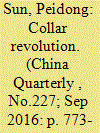

|
|
|
|
|
| Summary/Abstract |
Scholars have paid little attention to Maoist forces and legacies, and especially to the influences of Maoism on people's everyday dress habits during the Cultural Revolution. This article proposes that people's everyday clothing during that time – a period that has often been regarded as the climax of homogenization and asceticism – became a means of resistance and expression. This article shows how during the Cultural Revolution people dressed to express resistance, whether intentionally or unintentionally, and to reflect their motivations, social class, gender and region. Drawing on oral histories collected from 65 people who experienced the Cultural Revolution and a large number of photographs taken during that period, the author aims to trace the historical source of fashion from the end of the 1970s to the 1980s in Guangdong province. In so doing, the author responds to theories of socialist state discipline, everyday cultural resistance, individualism and the nature of resistance under Mao's regime.
|
|
|
|
|
|
|
|
|
|
|
|
|
|
|
|
| 3 |
ID:
148763
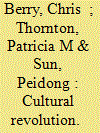

|
|
|
| 4 |
ID:
148765
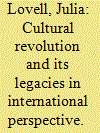

|
|
|
|
|
| Summary/Abstract |
This article explores the rhetoric and reality of the Cultural Revolution as an international phenomenon, examining (through published and oral histories) the ways in which it was perceived and interpreted beyond China. It focuses in particular on the diverse impact of Maoist ideas and practice on the counterculture movement of Western Europe and North America during the late 1960s and 1970s. Within Europe, Cultural Revolution Maoism galvanized Dadaist student protest, nurtured feminist and gay rights activism, and legitimized urban guerrilla terrorism. In the United States, meanwhile, it bolstered a broad programme of anti-racist civil rights campaigns and narrow Marxist-Leninist party-building. Despite Mao's hopes to launch a global permanent revolution, it appears that, over the long term, enthusiasm for the Cultural Revolution in Western Europe, the United States and parts of South-East Asia helped to splinter the radical left and assisted the right in consolidating its power throughout the 1980s and beyond.
|
|
|
|
|
|
|
|
|
|
|
|
|
|
|
|
| 5 |
ID:
148768
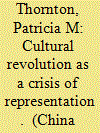

|
|
|
|
|
| Summary/Abstract |
The May 16 Notification, which set the agenda for the Cultural Revolution, named the movement's key targets as those “representatives of the bourgeoisie who have sneaked into the Party, the government, the army, and all spheres of culture.” The ensuing uprising of students and workers, many of whom claimed to be the loyal “representatives” of revolutionary and radical forces at the grassroots of society, exposed the fulminating crisis of political representation under CCP rule. This article considers the Cultural Revolution as a manifestation of a continuing crisis of representation within revolutionary socialism that remains unresolved to the present day, as demonstrated by the tepid popular response to Jiang Zemin's “three represents” and widespread contemporary concerns about the Party's “representativeness” (daibiaoxing 代表性) in the wake of market reform. Although the Cultural Revolution enabled both public debate of and political experimentation with new forms of representative politics, the movement failed to resolve the crisis. The Party's lingering disquiet regarding issues of representation thus remains one legacy of the Cultural Revolution.
|
|
|
|
|
|
|
|
|
|
|
|
|
|
|
|
| 6 |
ID:
148769
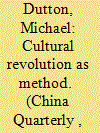

|
|
|
|
|
| Summary/Abstract |
This paper treats the Chinese Cultural Revolution as a means by which to open on to a more affective approach to the question of the political. It examines one piece of art-technology of that period and shows the way it intuitively worked within the fluidity of power to produce political intensity. This one technology is a microcosm of the Cultural Revolution notion of the political that was built around an attempt to channel and harness affective power towards revolutionary ends. Both because it attempts to direct the political through the affective dimension and because its methods of doing so resembled contemporary art practices, this paper opens on to the possibilities of a method based on an art rather than a science of the political.
|
|
|
|
|
|
|
|
|
|
|
|
|
|
|
|
| 7 |
ID:
148767


|
|
|
|
|
| Summary/Abstract |
This article focuses on the debate surrounding constitutionalism that has been driven by a constitutionalist alliance of media reporters, intellectuals and lawyers since 2010, and follows its historical trajectory. It argues that this debate forms a discourse with a structuring absence, the roots of which can be traced back to the taboos surrounding the Cultural Revolution, the 1975 Constitution, and everything associated with them. The absence manifests itself in the silence on workers' right to strike, a right which was deleted from the 1982 Constitution in an attempt to correct the ultra-leftist anarchy of the Cultural Revolution. Previous and in contrast to that, there was a Maoist constitutional movement in the Cultural Revolution, represented by the 1975 Constitution, that aimed to protect the constituent power of the workers by legalizing their right to strike. Today, we are witnessing the rise of migrant workers as they struggle for trade union reform and collective bargaining with little support from the party-state or local trade unions. In this context, a third constitutional transformation should be considered that is not a return to the 1975 Constitution but which instead adds some elements which protect labour's right to strike to the 1982 Constitution.
|
|
|
|
|
|
|
|
|
|
|
|
|
|
|
|
| 8 |
ID:
148766
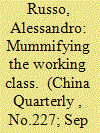

|
|
|
|
|
| Summary/Abstract |
A number of prolonged political experiments in Chinese factories during the Cultural Revolution proved that, despite any alleged “historical” connection between the Communist Party and the “working class,” the role of the workers, lacking a deep political reinvention, was framed by a regime of subordination that was ultimately not dissimilar from that under capitalist command. This paper argues that one key point of Deng Xiaoping's reforms derived from taking these experimental results into account accurately but redirecting them towards the opposite aim, an even more stringent disciplining of wage labour. The outcome so far is a governmental discourse which plays an important role in upholding the term “working class” among the emblems of power, while at the same time nailing the workers to an unconditional obedience. The paper discusses the assumption that, while this stratagem is one factor behind the stabilization of the Chinese Communist Party, it has nonetheless affected the decline of the party systems inherited from the 20th century.
|
|
|
|
|
|
|
|
|
|
|
|
|
|
|
|
| 9 |
ID:
148771


|
|
|
|
|
| Summary/Abstract |
During the 1980s, the immediate memory of the Maoist rustication movement expressed itself almost exclusively through the vector of literature, but since 1990, for reasons worth reflecting upon, a wide range of memorial activities have developed, involving a large number of the former educated youth (zhiqing). In the 2000s, this field benefited from the generalization of the internet and is still very much alive today. At each stage, this mainly popular or unofficial (minjian) memory had to negotiate a breathing space with a party-state still intent on controlling history and collective memory, especially concerning any topic directly linked with the Cultural Revolution. Thus, if memories of an important event are always varied because of the different personal experiences of the past and different individual situations and aspirations in the present, the spectrum of the zhiqing memories has also been complicated by political considerations. This paper does not try to present an exhaustive picture of this large memorial field; instead, through different examples, it attempts to reflect upon the meaning of the strong memorial aspirations of the zhiqing. It argues that only a genuine respect for history (as shown in the remarkable endeavours of some former zhiqing) will help this generation to transcend the conflict of memories to find meaning in its own fate.
|
|
|
|
|
|
|
|
|
|
|
|
|
|
|
|
| 10 |
ID:
148773


|
|
|
|
|
| Summary/Abstract |
This article uses fresh archival evidence to point at a rarely noticed phenomenon, namely the undermining of the planned economy by a myriad of dispersed acts of resistance during the last years of the Cultural Revolution. Villagers reconnected with the market in some of the poorest places in the hinterland as well as in better-off regions along the coast. This silent, structural revolution often involved the quiet acquiescence, if not active cooperation, of local cadres. In conclusion, the article suggests that if there was an architect of economic reforms, it was the people and not Deng Xiaoping: as with his counterparts in Central Europe and the Soviet Union, Deng had little choice but to go along with the flow.
|
|
|
|
|
|
|
|
|
|
|
|
|
|
|
|
| 11 |
ID:
148770


|
|
|
|
|
| Summary/Abstract |
Song Binbin, the daughter of prominent CCP politician Song Renqiong, has long been accused of having played a role in the death of Bian Zhongyun which took place at the Girls' Middle School in Beijing Normal University on 5 August 1966. In January 2014, she publicly apologized for the violence that occurred at her school during the summer of 1966. However, instead of applauding her act of contrition, rebel participants of the Cultural Revolution used the opportunity to criticize the sons and daughters of high-ranking cadres and to try to overturn the 1981 official evaluation of the Cultural Revolution by promoting a positive view of that period in Chinese history. This paper analyses the background, consequences and implications of Song Binbin's apology from a political science cum memory studies perspective. It argues, against the background of a changing political landscape in the People's Republic of China, that the memory of the Cultural Revolution remains a battlefield of divergent memory groups and multiple narratives. In the memory of today, the struggles of the Cultural Revolution have still not come to an end.
|
|
|
|
|
|
|
|
|
|
|
|
|
|
|
|
|
|
|
|
|